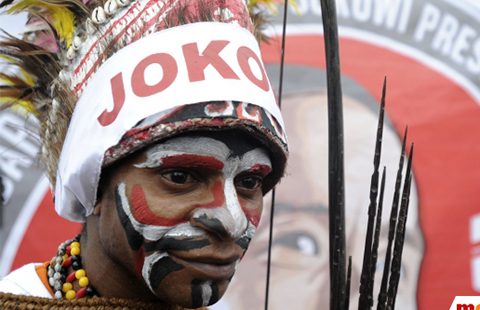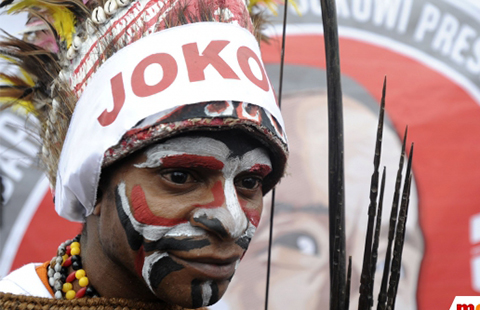One of Jokowi’s ‘trademarks’, dialogue, offers the best chance of giving disaffected Papua what it needs and wants, writes Hipolitus Yolisandry Ringgi Wangge.
During his presidential campaign, Joko Widodo, widely known as “Jokowi,” visited the Indonesia’s most eastern province, Papua, three times.
He made one key promise to Papuans–giving it more attention.
This attention includes promoting welfare instead of security , building more infrastructure, and providing more access to education and medical services. All of these seem relatively similar to former president Susilo Bambang Yudhoyono’s (SBY) promises when he came to office in 2004.
Whether Jokowi’s government can keep his promises to the Papuan people, rest on three factors; affirmative action, welfare policy, and the military . And all of these have to factor in Jakarta’s decision-making elites. In this regard, it’s useful to look at what previous governments did in Papua.
Since the downfall of Suharto in 1998, Papua has been one of Indonesia’s three trouble spots, haunting every regime. Of the other two East Timor attained its independence in 1999, and Aceh received its special privileges under the 2005 Helsinki Agreement. Even though, the Papuan rebellion movement is categorised as a small-scale armed struggle, there is no comprehensive policy that can suppress its aspiration to detach from Indonesia.
Former presidents BJ Habibie and Abdurahman “Gus Dur” Wahid undertook affirmative action in Papua. They knew that as the Papuan people are a minority group which has been excluded and underrepresented historically, measures had to be taken to raise participation at various level of society. Habibie invited 100 Papuan representatives to hold a discussion in Jakarta in 1999 and promised to initiate an equal dialogue between Jakarta and Papua.
Yet the dialogue never happened. Gus Dur proposed more progressive measures by allowing the Papuans to hold the First Papua National Assembly in June 2000, crafting a space for Papua to reclaim its names as “Papua,” not “Irian,” and permitting the Papuan flag to be raised alongside the Indonesian flag. He also included Freddy Numberi, the first Papuan after the downfall of Suharto, to become a cabinet member. However, both presidents firmly rejected the idea of West Papuan independence.
Megawati, the daughter of Indonesia’s founding father Sukarno, amplified the military approach to Pa[ua rather than taking more comprehensive affirmative actions. She launched the Special Autonomy Law (Otsus) in 2001 as a way to uplift Papuans’ lives, yet she also issued a presidential decree (Inpres No.1/2003) to divide Papua into three new provinces, thus contradicting the spirit of the autonomy law. Moreover, Megawati’s feeblest policy allowed the military to tightening its grip over Papua, an action it had long favored. The 2001 killing of charismatic Papuan leader Theis Elluay, by the Indonesian Special Forces (Kopassus), occurred under her tenure.
Susilo Bambang Yudhoyono, who took over government in 2004 and left office in October 2014, combined affirmative action and welfare policies without thoroughly reviewing the military’s presence in Papua. During his 10-year tenure, SBY included three Papuans in his government. In 2010, he initiated the mega investment project, the Merauke Integrated Food and Energy Estate (MIFEE), at the expense of customary rights over land that belongs to Papuans. In 2012, he proposed an ad-hoc agency, the Unit for the Acceleration of Development in Papua and West Papua (UP4PB) which has had no impact whatsoever.
Additionally, SBY failed to review security policies that have been in place since this province was forcefully integrated into Indonesia in 1969. Human rights abuses by the military still frequently occur.. Ironically, the military reform initiated during SBY’s first term has had no impact in Papua. Antonius Made argues that military reform failed at the domestic level, particularly in conflicted regions. Three indicators of the failure are the military deployment and its relation to the rise of human rights violations, the military involvement in local politics, and its close ties to business in Papua.
When it comes to Jokowi, many Papuans believe that he will overhaul current conditions in the province. And yet it seems his government will continue what has been done so far. Shortly after he was inaugurated, he appointed Yohana Susana Yembise, the first female Papuan minister, in an act of affirmative action. However, there is no policy yet directly addressing the Papuan issue.
There is also the question of how Jokowi will deal with development in Papua. This concern is related to the investment-oriented agenda he presented in front of business leaders at the Asia Pacific Economic Cooperation (APEC) summit in China a couple of weeks ago. Whether or not there will be another project like MIFEE is still a big question.
In terms of welfare reforms, Jokowi’s government has moved forward by providing three cards; the prosperous family card, the health card, and the smart card. All of these cards are related to the welfare program he promised during the presidential campaign. However, these cards seem unlikely to deal with current conditions in Papua. The basic prerequisite of this program is infrastructure readiness and its stakeholders. In Papua, as Bobby Anderson argues in Inside Indonesia (Jul-Sep 2013), it is about not only hospitals or schools, but also who will be serving as a doctor, nurse, or teacher. In this regard, the central government has to review all welfare programs in Papua before promoting other programs.
Another crucial policy that will be launching in coming months is the transmigration policy. The new transmigration minister, Marwan Jafar, proposed a transmigration program for people from outside islands, primarily from Java, to go to Papua. Shortly after the announcement, many Papuans raised their concerns and firmly rejected the policy. This concern is highly understandable.
According to the Justice and Peace Secretariat of the Jayapura Bishopic Mission huge numbers of people transmigrating has negatively affected the indigenous population by subordinating Papuans in cultural, political, and economic spheres. This shift in population leads to never-ending conflicts between the settlers from the outside islands and the indigenous people.
Furthermore, the transmigration policy will exaggerate the current Papuan demographic structure and also the relation between the central government and Papuans. The decline of the indigenous population is obvious. According to Anderson (quoted in The Jakarta Globe), migrants from other islands now compose almost half the population of Papua province. In addition, while the ratio of indigenous people and non-indigenous people, was 52-48 in 2010, Anderson predicts there may be 60 migrants to every 40 Papuans in 2014.
In the security arena, there will not be any significant change under Jokowi, particularly the huge number of military troops in Papua. This tendency can be seen by the appointment of one of the most controversial and conservative generals, Ryamizard Ryacudu, as the Indonesian defense minister. Papuans still remember him as a general who praised as heroes the Kopassuss soldiers who killed Theys Elluay.
In addition, Jokowi has appointed Andhika Perkasa as commander of the presidential security detail. According to the Jakarta Post, Andhika was allegedly involved in the killing of Theis Elluay when he was a Koppasus officer back in 2002. Other former generals with bad human rights records, such as Hendropriyono, Wiranto, and Sutiyoso also have been in Jokowi’s inner circle. All of these figures will maintain the military conservative value of defending the unity of the country by wiping out all rebellion groups, even at the expense of civilians–as it has over the years.
All the policies and actions proposed so far clearly describe the ‘elitist’, Jakarta-centric way of thinking on the Papuan issue. For example, Marfan Jafar is a former politician from the National Awakening Party (PKB) that has supported Jokowi. As a politician without sufficient background on the Papuan issue, Jafar clearly has been initiating an ill-constructed policy. He thinks by sending many migrants to Papua, the problem of poverty in some densely populated islands, will partly be handled without looking at the real condition of the Papuan people.
Accordingly, one can argue that Jokowi lacks ministers who can absorb his vision deeply. Because he has to compromise with those elites, oligarchs, and former generals, he has to sacrifice the people’s hope. This is an irony of democracy. Jokowi has been elected constitutionally, but he cannot fully exercise his right to govern because he has to deal with those shadowy figures, which have no constitution rights whatsoever.
Beyond these challenges, Jokowi has to execute a long-awaited dialogue with the Papuans. This is the prominent solution to deal with all problems in Papua. Consultations are the only way to know deeply and thoroughly what Papuans need. In turn, the central government can form policy that positively affects Papuans. The Papua Peace Network (JDP) formed by the Indonesian Institute of Sciences (LIPI) has been conducting preliminary consultations that can be used as a gateway to create a more intensive and comprehensive dialogue with the Papuans.
A network of various political actors in Papua has been set up through the consultations.It would be constructive if the central government gradually held discussions with various actors, such as local activists, student activists, religious figures, armed groups, and particularly those who are living and struggling for Papuan independence from abroad.
Dialogue was one of Jokowi’s “trademarks” (beside the impromptu visit), when he was mayor of Solo, and governor of Jakarta. This is a real opportunity for Jokowi to execute the dialogue with the Papuan people. By supporting consultation with the people, the government can send a strong signal about building trust and eliminating suspicions regarding Papua.
Hipolitus Yolisandry Ringgi Wangge, is an Arryman Scholar and a visiting scholar at the Buffet Center for International and Comparative Studies (BCICS), Northwestern University.
 Facebook
Facebook  Twitter
Twitter  Soundcloud
Soundcloud  Youtube
Youtube  Rss
Rss 
